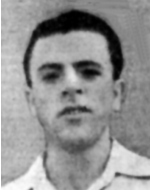Schreiber, Yosef
Yosef, son of Bela and Yeshayahu Schreiber, was born in 1928, in Bozdet, in the district of Marmarosh, Romania. He studied in a cheder and later also in a Romanian government school, where he suffered greatly from the anti-Semitic attitude of the teacher and the Christian boys with the encouragement of the teacher. Because of his refusal to write on Shabbat, he was brutally beaten. When the region was returned to Hungary in 1940, he continued to study in a special government school for Jews, in which antisemitic abuse continued. They were forced to write and even to work hard and filthy work every day, especially on Shabbat. In 1944 he was taken to the ghetto with the Jews and tortured there. He was taken to the Auschwitz death camp with everyone, and on the way he risked his life to get food and water for his mother and sister. From the extermination camp he was transferred with his father and brothers to a labor camp in Silesia. He was greatly weakened by hard labor and poor and inadequate nutrition. He bravely survived yet than once managed to get food for a father and brother. When the Russians approached, he was transported on foot to Buchenwald on a two and a half month journey, and out of the thousand people who set out on the journey was one of the dozens who arrived alive. The last terrible days of the Nazi regime were spent in hiding in a dark cellar, where he was fed raw potatoes. The American liberators found him sick with typhoid fever and after three months in a hospital he returned home to search for the remainder of his family. He left with one of his brothers on the “Bericha route” to Austria, and spent a year on a kibbutz of the Dror youth movement. He moved to Italy and boarded the ship “Af-Al-Pi”, and after a fierce struggle with the British was sent to Cyprus. “I hope that I will soon be in Israel, in our independent state, and Bevin will have to release us,” he said in a letter to his brother, expressing his sorrow at the delay. Joseph immigrated to Israel in March 1948, during the War of Independence, arrived at Kibbutz Gesher and joined the workers and defenders. “The tense situation does not frighten us,” he wrote to his brother. “We have weapons and young men and we will fight.” He fell while defending a bridge against the first attack of the Arab Legion, on the 18th of Nissan 5748 (April 27, 1948). He was laid to rest in the cemetery at Gesher.
